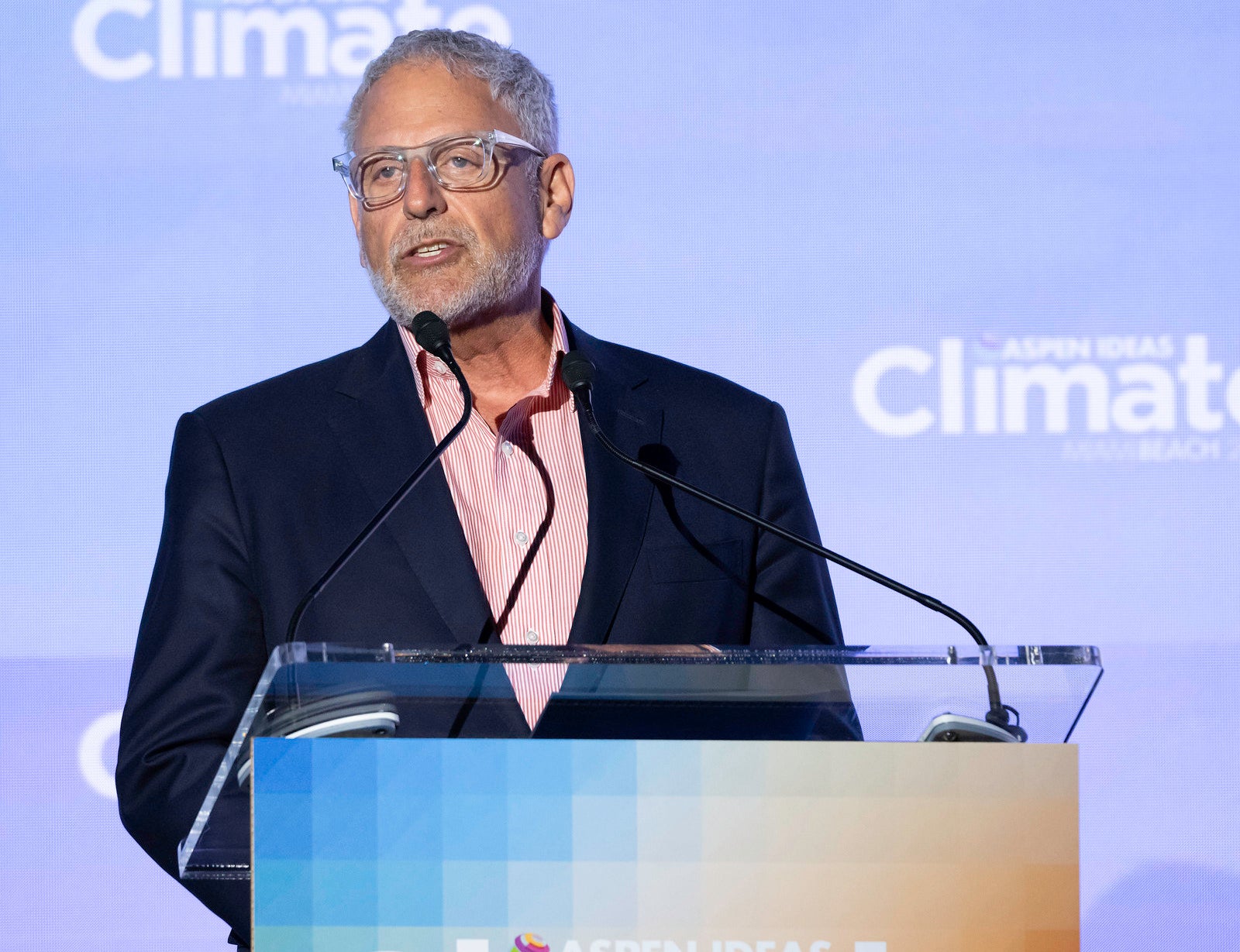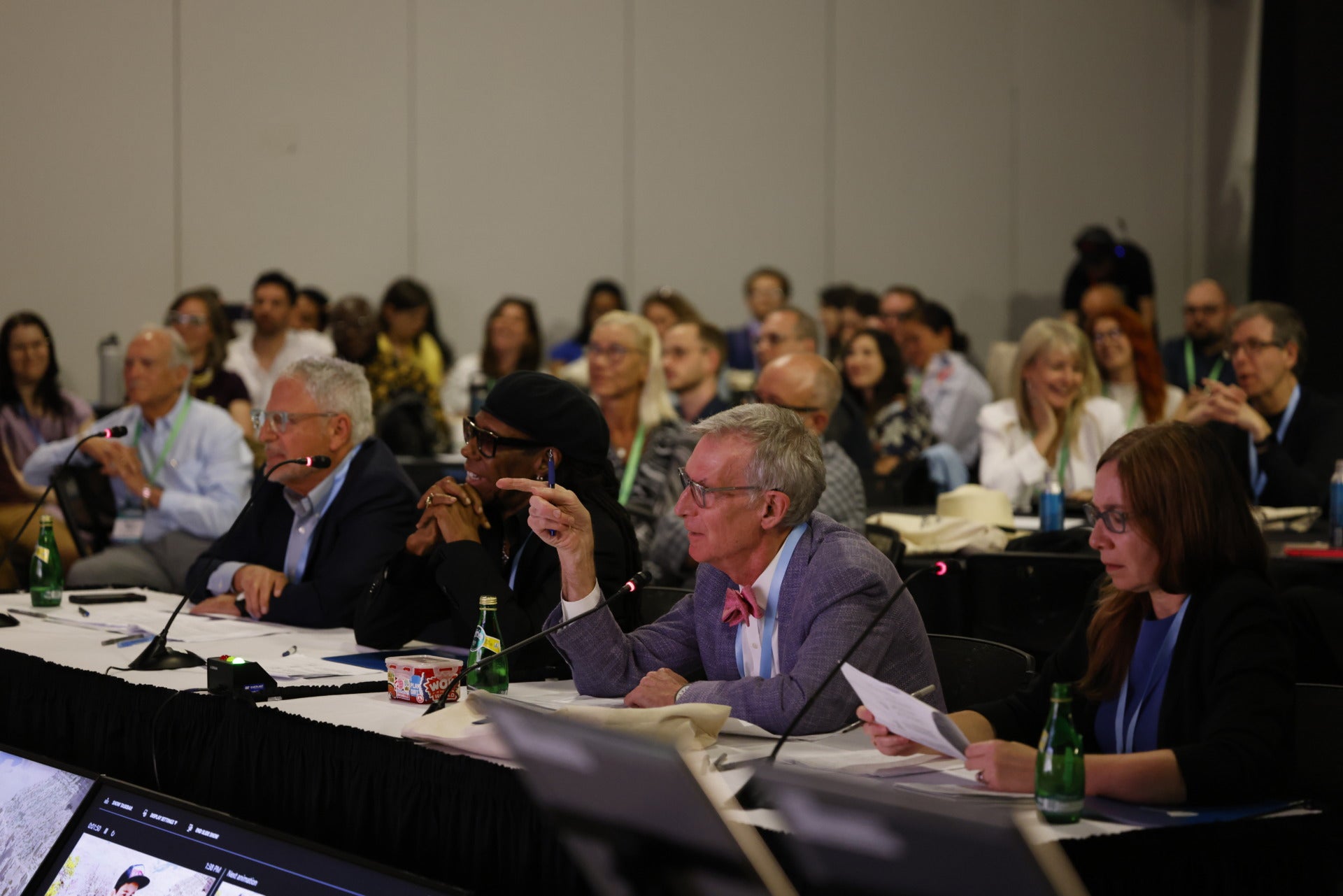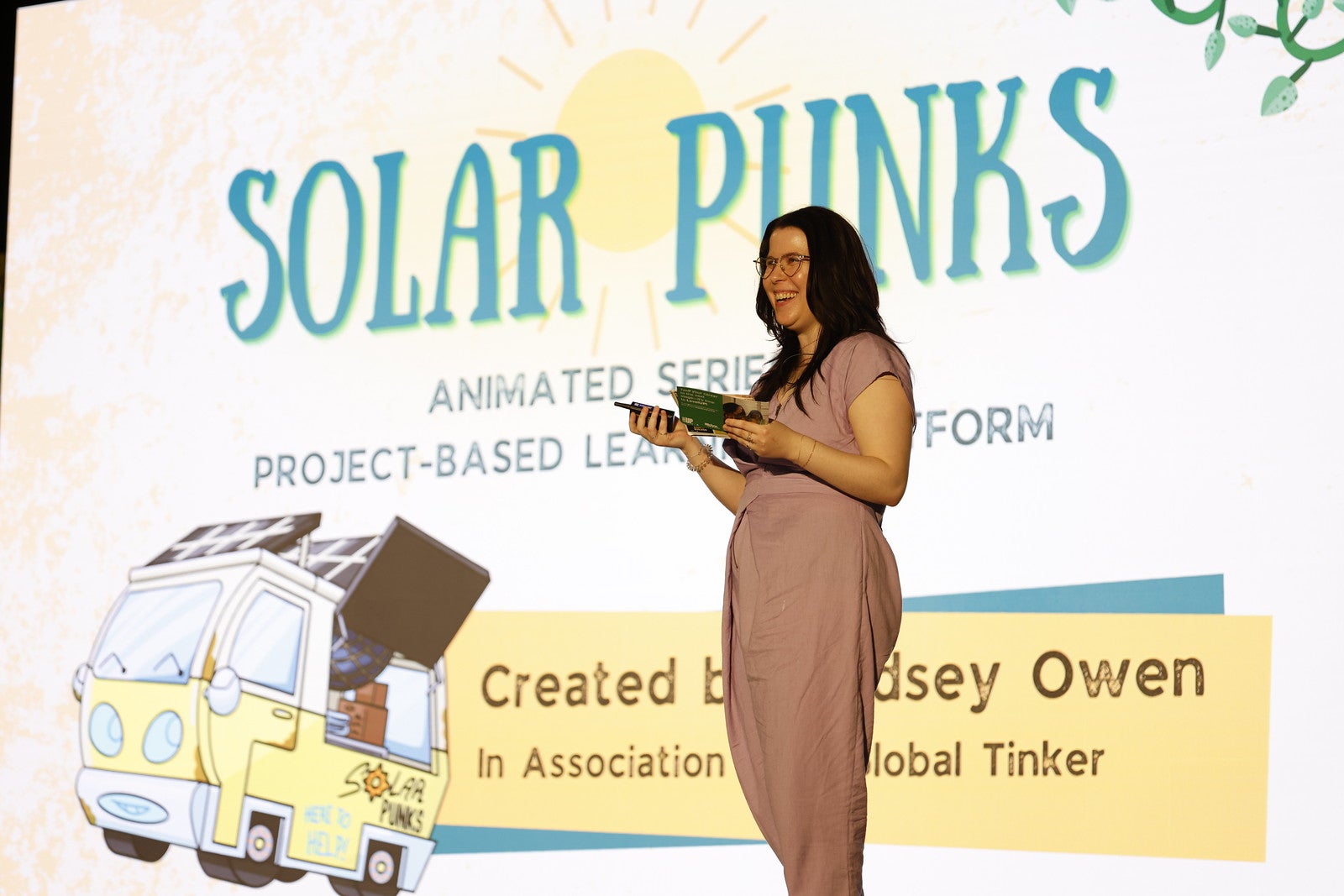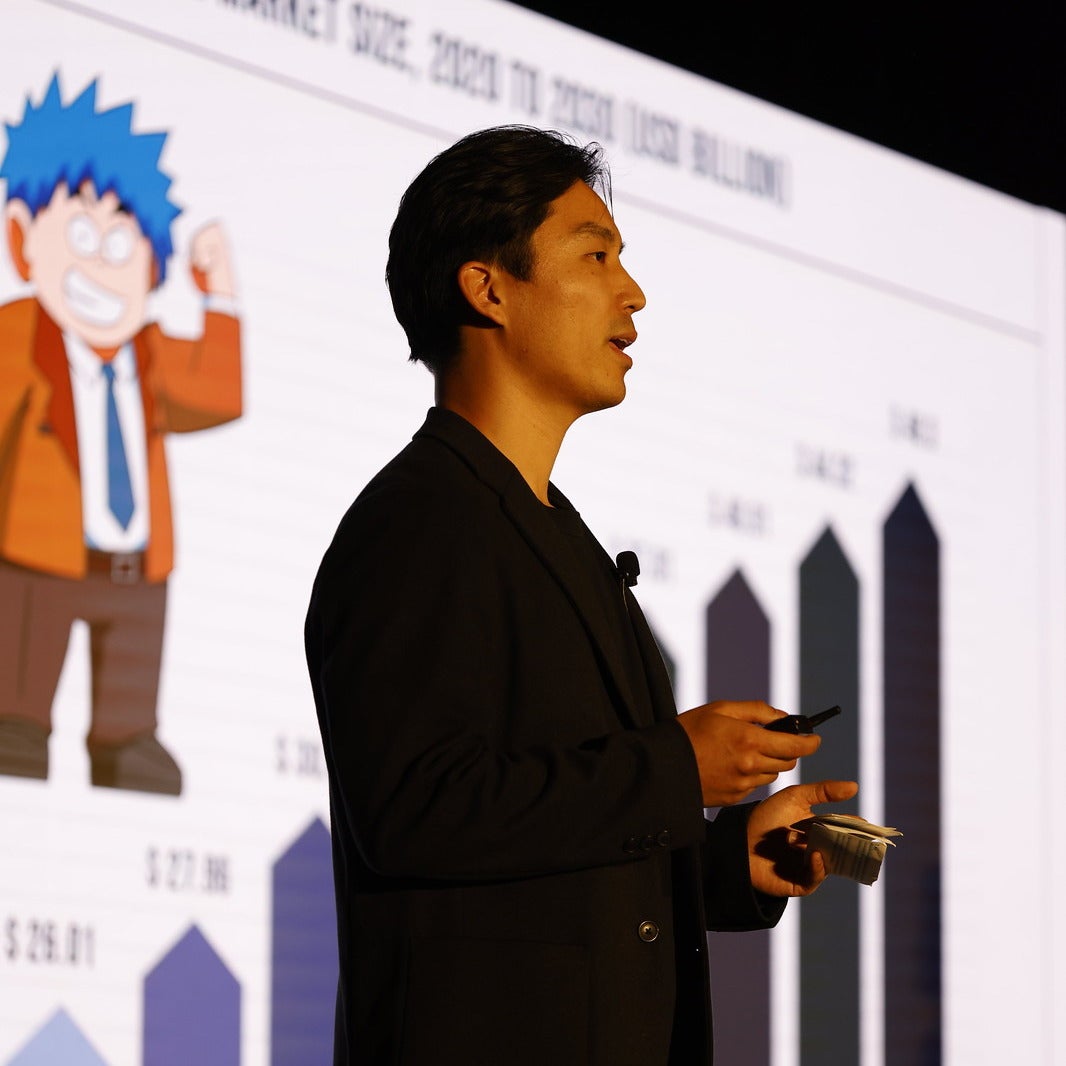According to the IPCC, children aged ten or younger in 2020 are expected to experience a nearly fourfold increase in extreme events under 1.5°C of global warming by 2100, and a fivefold increase under 3°C warming. But research from Aspen Institute’s This is Planet Ed initiative shows that children’s media is largely silent on climate change.
Planet Media is setting out to change that. Earlier this year, they launched the Planet Media Call for Pitches with the goal of generating creative ideas for short-form content to support children ages 8-12 in understanding four essential climate principles focused on hope, humor, and solutions. “By creating clear, science-based principles and elevating great content ideas, we hope to create momentum in the industry for more children’s climate storytelling focused on hope and solutions,” said Gary Knell, co-chair of the Planet Media Task Force and former CEO of National Geographic and Sesame Workshop.

Gary Knell speaks at the 2024 Aspen Ideas: Climate conference. Photo by Dan Bayer.
Selected from over 200 entrants, seven creative teams were chosen as finalists and given the opportunity to give a live presentation of their idea at Aspen Ideas: Climate in Miami Beach. They pitched to a panel of esteemed judges that included Knell, science educator Bill Nye, musician and producer Nile Rodgers, and chief scientist of The Nature Conservancy Katharine Hayhoe. Following the Pitch Fest, Planet Media announced that the initiative will be supporting all of the finalists in the creation of climate content incorporating the essential climate principles.
We caught up with several of the awardees to learn more about their projects, their favorite children’s media, and their climate concerns. Young Park and Nak Yong Choi of Park Star Media were awarded a budget of $40,000 to produce a 2D science-fiction anime-style series called “Yo Zeno,” which features a rebellious space prince who embarks on an epic intergalactic adventure and learns essential climate lessons. Lindsey Owen, was awarded $20,000 to support production of her animated video idea “Solar Punks,” about time-traveling heroes who help kids find solutions to ecological problems in a solarpunk, utopian setting. In addition, Erica Rabner and Robby LeDoux were awarded $20,000 to make “Cold Sweat,” a song-centered drama about a Texas tween who becomes a climate vlogger.
What are some of your favorite shows or pieces of media you watched as a kid that really stuck with you and informed your work today?
Young Park: My favorite childhood shows were those that combined thrills with thought-provoking ideas, from the fast-paced action of “Powerpuff Girls” and “Dragonball” to the science-filled worlds of “Dexter’s Laboratory” and “Full Metal Alchemist.” As a kid, these shows taught me to appreciate the wonder of discovery and the strength found in imagination, values that guide me today as well.
Nak Yong Choi: One significant cartoon that impacted me was “Courage the Cowardly Dog,” where he would shout “the things I would do for love” and that in a way inspired me to love more. I also loved shows like “Shin Chan,” “Doraemon,” where whimsy was a virtue, and shows like “One Piece” and the Ghibli films imbued in me to be the optimistic change I want to see in the world.
Lindsey Owen: I love this question! There are so many kids’ shows that had a huge impact on me and made it clear that I wanted to spend my life making cartoons. I’ll try not to make this a never ending list. Some of the ones I come back to the most frequently are “Hey Arnold!,” “Recess,” “As Told by Ginger,” and “Avatar: The Last Airbender.” Three out of the four of those are intimate, slice-of-life stories about being in school, and then one huge, sweeping fantasy. But I think what resonates the most across all four is the characters, who all feel simultaneously very specific and real, but also filtered through a kid’s eyes. I could see myself, my friends, my life reflected in all of them, and it made me feel understood in a way that I really treasure.
I also want to mention a couple of gentler, younger shows that really informed my sensibilities, which are “Arthur” and “Blue’s Clues.” They both have a kindness and sincerity to them that I try to bring to all my work. I hate mean-spirited humor, and all the things I love have a real earnestness at their core that those two shows capture perfectly. And I have to shout out some of my favorite kids’ shows that came out while I was an adult but still ignited my childlike wonder, like “Gravity Falls,” “Over the Garden Wall,” “Steven Universe,” and “Craig of the Creek.”
Erica Rabner: Growing up, I loved shows that took me places I couldn’t go myself. Whether I was diving into the human body with “The Magic School Bus” or racing through the jungle with “The Wild Thornberrys,” I loved being able to explore another world. As an educator, I see kids’ media as an equalizer and am excited for “Cold Sweat” to tap into that same principle by bringing kids to the Great Barrier Reef and hillside of Texas to highlight climate concepts that may be less striking in their backyards.
I was always drawn to social emotional shows that dealt with family dynamics and personal relationships like “Boy Meets World” and “7th Heaven.” I liked watching characters struggle with issues that felt relatable and seeing conflict resolution unfold. Leaning into the emotions and marrying them with messages continues to shape how I approach songwriting.
Finally, “Sesame Street” had the biggest impact on my professional trajectory. As an older sibling, I saw the impact firsthand when my brother who was slow to speak began picking up scrabble tiles and proclaiming “the letter ‘s’ and so on in a voice that sounded like Grover. To me, that exemplifies the power of kids’ media which inspired me to get into children’s educational media.
Robby LeDoux: I loved PBS, “Sesame Street.” Everything PBS seemed to take the environment into consideration and that rang true for me. I know having that foundation helped me teach my daughter how important the world around her was and to take care of it. Of course, “Schoolhouse Rock,” how songs can teach kids! Even as a very small child I have indelible gauzy memories of “Speed Racer” which may have informed my love of brighter anime for little kids. I liked offbeat stuff on Nickelodeon then wound up working for them! When my daughter was little, we fell in love with Studio Ghibli, again the anime genre for young children. Anything with a song I loved so when the opportunity to make songs for kids hit my desk at Nickelodeon, I jumped and haven’t looked back! Writing songs for an older age demo, teens and tweens, is a dream come true!

Seated, left to right: Gary Knell, Nile Rodgers, Bill Nye, and Katharine Hayhoe. Photo by Dan Bayer.
How do you balance the seriousness of climate change with the sense of optimism that can give kids hope for a brighter future? How do you hope your work makes kids feel about the climate?
Robby LeDoux: For me, solving problems is cathartic. Especially if you do it as a team. In this instance it’s a global team of like minded young people who will change the world. It’s powerful. Climate change can be scary but turning it around is an amazing goal to set. It’s really in their hands and they can do it!
Erica Rabner: Climate change can definitely be heavy and overwhelming but speaking with young people inspires us. Our goal is to channel the optimism kids provide us and answer their questions with a curriculum that allows us to marry the science and complex emotions we all experience around climate change.
Lindsey Owen: I try to strike this balance in “Solar Punks” by making the link between the present and the future really visual and concrete. When people in our present make climate mistakes, it manifests in our main characters’ future at the beginning of every episode. They’re always solving a concrete problem that illustrates for our audience, say, how the future will be a barren wasteland without pollinators, or how the temperature will be unlivable in the future if our greenhouse gas emissions continue. By having part of the story take place in the future, it ceases to be a hypothetical problem and the consequences become something viewers can see.
But we can use this logic for hope, too! “Solar Punks” always ends with finding a present-day action that will positively impact the future. And when the main characters travel to the future with these new actions implemented in the past, we get to see how the ripple effect created a brighter future. We show both sides of the coin: how climate change poses serious problems but we have the power to fix it. I hope “Solar Punks” will make our viewers feel powerful and effective in the face of this challenge.
Young Park and Nak Yong Choi: Our aspiration with ‘Yo, Zeno!’ is to foster a sense of responsibility and inspiration among viewers, drawing on the Aspen Institute’s climate principles and planting the seeds for the future guardians of our planet. The stories and characters we’ve created are designed to resonate with children globally, empowering them to feel that they are understood, capable, and vital in the fight against climate change.
The concept of interconnectedness is also central to our narrative. As Zeno discovers the beauty and fragility of Earth, from its lands to the vast oceans and beyond, he learns the importance of environmental stewardship. It’s his journey of realizing Earth’s value (his newfound home) that we hope will inspire viewers to take action, emphasizing that every choice we make has a ripple effect on our planet.

Lindsey Owen pitches her project “Solar Punks” to the judges at Aspen Ideas: Climate. Photo by Dan Bayer.
In “Solar Punks,” the characters time travel to the future and see firsthand the consequences of climate mistakes. Lindsey, how did you come to the decision to use time travel to illustrate the impact of our choices today on creating a better future?
Lindsey Owen: When I originally conceived of “Solar Punks,” it took place entirely in the utopian future setting and there was no time travel element. But as I continued to develop the idea, it became clear to me that climate anxiety was much more present among kids than I originally thought, and that there was an urgency there that I hadn’t sensed before. I thought it would be more comforting to kids to see themselves as agents for a better future, so I started to look for a way to incorporate present-day kid characters into a story about a utopian future. Thus, the time travel element was born! And as I stated above, I think time travel is a great way to make a hypothetical problem very concrete. If we show kids the future and the people that live there, when they take climate-positive action, they’ll feel like they’re helping friends they know and a place they’ve visited. I hope that it’ll create a sense of them being heroes for the generations to come.
In “Yo Zeno!,” Zeno’s uncle is an evil space king who is wreaking havoc on the environment. Young and Nak, how did you decide to make the evil space king Zeno’s uncle? How does their familial relationship complicate Zeno’s feelings and desire to protect the planet, since he has to rebel against his family?
Young Park and Nak Yong Choi: In every family, including our own, there’s a natural tension between parental guidance and the child’s growing independence. These disagreements, whether over minor issues or fundamental values, highlight a universal truth: we love our parents, but also strive to forge our own identities. Parents, with their desire to protect and guide us, may not always align with our own sense of what’s right for us. This dichotomy is at the heart of Zeno’s dilemma.
Faced with his family’s legacy through his uncle, the evil space king, Zeno opts to chart his own course, safeguarding the Earth despite the familial bonds that pull him in a contrary direction. His rebellion is not just against his uncle but represents a broader struggle for autonomy and the courage to follow one’s convictions, even when it means standing alone.

Young Park talks about “Yo Zeno!” onstage at Aspen Ideas: Climate. Photo by Dan Bayer.
In “Cold Sweat,” tween Lila explores the climate issue through songwriting. How does using music and song in your work make complex subjects more approachable and relatable to kids?
Robby LeDoux: Teens and tweens relate to emotional subjects, so bringing that approach to our songs gives us the opportunity to meet them where they are. I feel kids don’t want to be preached to but are hungry for perspectives that resonate with them. Climate change is a subject that they take seriously. If our songs can channel some of those feelings, we’ve done our job writing them for this project!
Erica Rabner: Sometimes it’s hard to relate to something like coral bleaching that feels miles away (literally). Songs allow us to connect on an emotional level and music has the power to make the impersonal feel personal. Our goal is to write sticky songs that people want to listen to again and again. Writing songs people want to play on repeat allows them to sit with concepts and emotions long after watching an episode. With layered songs like these, the more you listen, the more you hear.
Watch the full pitch fest below to learn more, and follow This Is Planet Ed on X/Twitter, Facebook, and Instagram to keep up with the projects!

